Abstract
Health worker productivity problems due to suboptimal institutional management still often occur, including at the dr. H. Marzoeki Mahdi Mental Hospital (RSJMM). Nurses are the most significant number of health workers in hospitals with a high level of patient intervention; inappropriate treatment risks decreasing work productivity. This research aims to analyze the effect of financial compensation, non-financial compensation, and work discipline on nurse productivity at RSJMM. The research study used a quantitative approach by distributing questionnaires to 205 nurses. The results showed partially (1) financial compensation has no significant effect on nurse productivity (Sig. value 0.953 > 0.05, β=0.002); (2) Non-financial compensation has a positive and significant effect on nurse productivity (Sig. value 0.016 < 0.05, β=0.073); (3) Work discipline has a positive and significant effect on nurse productivity (Sig. value 0.000 < 0.05, β=0.293). The work discipline variable (0.293) most dominantly affects nurse productivity. Simultaneously, the three variables have a moderate effect on nurse productivity of 0.576 or 57.6%, while other variables influenced other variables influenced the remaining 42.4%. These results have limitations that are based on respondent's perceptions. It is suggested that hospitals need to optimize nurse productivity by improving hospital facilities, training, educational opportunities, transparency and fairness of compensation systems, recognition and feedback for employee performance, and compliance with work discipline.
References
- Fogel P. Superior Productivity in Healthcare Organizations: How To Get It, How To Keep It. 2nd ed. United States of America: Health Professions Press, Inc; 2016.
- Kemenkes RI. Rencana Aksi Program (RAP) BPPSDM kesehatan 2020-2024. 2020;1–56. Available from: https://e-renggar.kemkes.go.id/file_performance/1-630870-3tahunan-604.pdf
- WHO. Health Workforce [Internet]. 2023. Available from: https://www.who.int/health-topics/health-workforce#tab=tab_1
- RSJMM. Laporan Kinerja PKJN RSJ. dr. H. Marzoeki Mahdi Bogor Tahun 2022 [Internet]. Bogor; 2023. Available from: https://www.rsmmbogor.com/cdn/File/LAKIP 2022_FINAL.pdf
- KPPAI RSJMM. Wawancara Studi Pendahuluan Penelitian. 2023.
- RSJMM. Laporan Semester 1 PKJN RSJ. dr. H. Marzoeki Mahdi Tahun 2022. Bogor; 2022.
- Sahara FW. Pengaruh Kompensasi Non Finansial Terhadap Produktivitas Kerja Karyawan Pada PT. Karya Indorata Persada Pabrik Kelapa Sawit Di Kecamatan Gunung Sahilan Kabupaten Kampar Kiri. Universitas Islam Riau; 2020.
- Bussin M. Retention Strategies : The Key to Attract and Retain Excellent Employees. South Africa: Knowledge Resources; 2018.
- Ivancevich K. Perilaku Manajemen dan Organisasi. Jakarta: Erlangga; 2016.
- Sumijatun. Jenjang Karir Perawat. Universitas Indonesia; 2022.
- Lulut W, Erwin S, Anita SD. Pengaruh Kompensasi Finansial Dan Disiplin Kerja Terhadap Produktivitas Kerja Karyawan Di Pt Intisumber Hasil Sempurna (IHS) Kediri. J Mhs J Ilm Penal dan Penelit Mhs. 2022;4(3):19–35.
- Sinambela LP. Manajemen Sumber Daya Manusia. Bumi Aksara; 2016.
- Sumampouw CL. Pengaruh Kompensasi Terhadap Produktifitas Kerja Karyawan Pada PT. Bank Tabungan Pensiun Nasional, Tbk Manado. 2013;2(3):1–22.
- Dominis S. Poor Performance, Low Productivity, and Inefficient Utilization of The Health Workforce. In U.S. Agency for International Development (USAID); 2018.
- Parwita GBS. Disiplin Kerja Karyawan (Suatu Kajian Teori). J Ilmu Manaj Mahasaraswati. 2015;5(2):105.
- Purwanto NF, Supaya S, Suwardi. Pengaruh Kompensasi Finansial Dan Kompensasi Non Finansial Terhadap Produktivitas Kerja Karyawan Di PT Sidomuncul Pupuk Nusantara Kabupaten Semarang. J Adm Bisnis. 2016;2–7.
- Sodikin AA, Sipayung TT. Pengaruh Kompensasi Terhadap Produktivitas Kerja Karyawan (Studi Kasus PT. Berdikari Meubel Nusantara). 2017;4(1):155–62.
- Muslimah DA. Pengaruh Kompensasi Terhadap Produktivitas Kerja Pada Karyawan Tetap dan Karyawan Kontrak PT. Dan Liris Indonesia. Universitas Negeri Yogyakarta; 2014.
- Wibowo AP. Pengaruh Kompensasi dan Disiplin Kerja Terhadap Produktivitas Kerja Karyawan CV Galuh Aji di Kulonprogo [Internet]. Universitas Islam Indonesia; 2014. Available from: https://dspace.uii.ac.id/handle/123456789/7496
- Jamalia AN. Pengaruh Kompensasi dan Disiplin Kerja Terhadap Produktivitas Kerja Karyawan Pada PT Trafoindo Prima Perkasa. Skripsi. Universitas Negeri Jakarta; 2015.
Bahasa Abstract
Permasalahan produktivitas tenaga kesehatan akibat pengelolaan kelembagaan yang kurang optimal masih sering terjadi, termasuk di RSUD dr. Rumah Sakit Jiwa H. Marzoeki Mahdi (RSJMM). Perawat merupakan tenaga kesehatan terbanyak di rumah sakit dengan tingkat intervensi pasien yang tinggi; perlakuan yang tidak tepat berisiko menurunkan produktivitas kerja. Penelitian ini bertujuan untuk menganalisis pengaruh kompensasi finansial, kompensasi non finansial, dan disiplin kerja terhadap produktivitas perawat di RSJMM. Penelitian menggunakan pendekatan kuantitatif dengan menyebar kuesioner pada 205 perawat. Hasil penelitian menunjukkan secara parsial (1) kompensasi finanisal tidak berpengaruh signifikan terhadap produktivitas perawat (nilai sig. 0,953 > 0,05, β=0,002); (2) kompensasi non finansial berpengaruh positif dan signifikan terhadap produktivitas perawat (nilai sig. 0,016 < 0,05, β=0,073); (3) disiplin kerja berpengaruh positif dan signifikan terhadap produktivitas perawat (nilai sig. 0,000 < 0,05, β=0,293). Variabel disiplin kerja (0,293) paling dominan mempengaruhi produktivitas perawat. Secara simultan, ketiga variabel berpengaruh moderat terhadap produktivitas perawat sebesar 0,576 atau 57,6%, sedangkan 42,4% sisanya dipengaruhi oleh variabel lain. Hasil ini mempunyai keterbatasan yang didasarkan pada persepsi responden. Disarankan rumah sakit perlu mengoptimalkan produktivitas perawat dengan meningkatkan fasilitas rumah sakit, pelatihan, kesempatan pendidikan, transparansi dan keadilan sistem kompensasi, pengakuan dan umpan balik terhadap kinerja pegawai, serta kepatuhan terhadap disiplin kerja.
Recommended Citation
Febrianti, Icha Tiara Devi and Andriani, Helen
(2024)
"The Effect of Compensation Policy and Work Discipline on Nurse Productivity at dr. H. Marzoeki Mahdi Mental Hospital Bogor in 2023,"
Journal of Indonesian Health Policy and Administration: Vol. 9:
No.
1, Article 1.
DOI: 10.7454/ihpa.v9i1.7344
Available at:
https://scholarhub.ui.ac.id/ihpa/vol9/iss1/1
Included in
Health Policy Commons, Health Services Administration Commons, Health Services Research Commons




